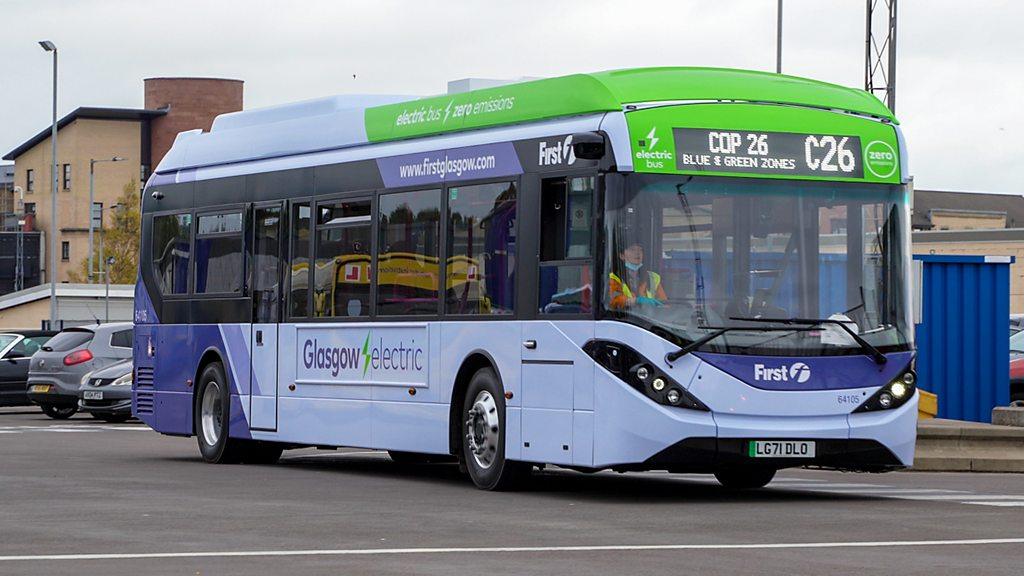Zero emissions: How will Wales move to electric buses?
- Published
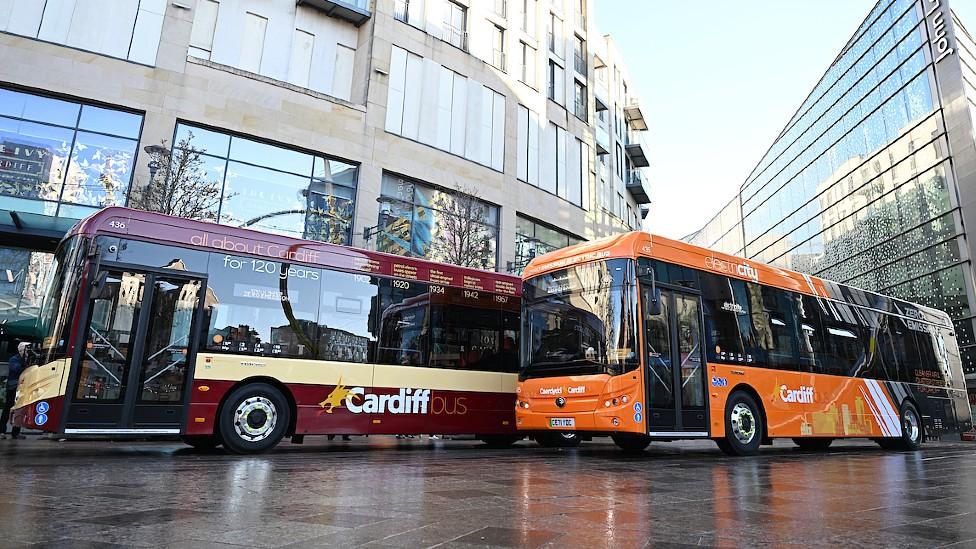
Cardiff Bus unveiled its new electric fleet in January
A plan to move the whole of Wales' bus fleet to zero-emission vehicles by 2035 needs a nationwide funding plan, operators have said.
Unlike England and Scotland, Wales does not yet have a government-run fund to help operators with the cost of green vehicles and infrastructure.
Newport and Cardiff have made big steps in bringing electric buses into use, but they are the outliers at present.
Work on a funding scheme is happening this year, the Welsh government said.
Cardiff Bus unveiled 36 new electric buses in January, which means zero emission (ZE) vehicles now make up almost a quarter of its fleet, four years after the first eight-week trial of an electric bus in the city.
Newport was the first place in Wales to install a permanent electric service bus in 2019.
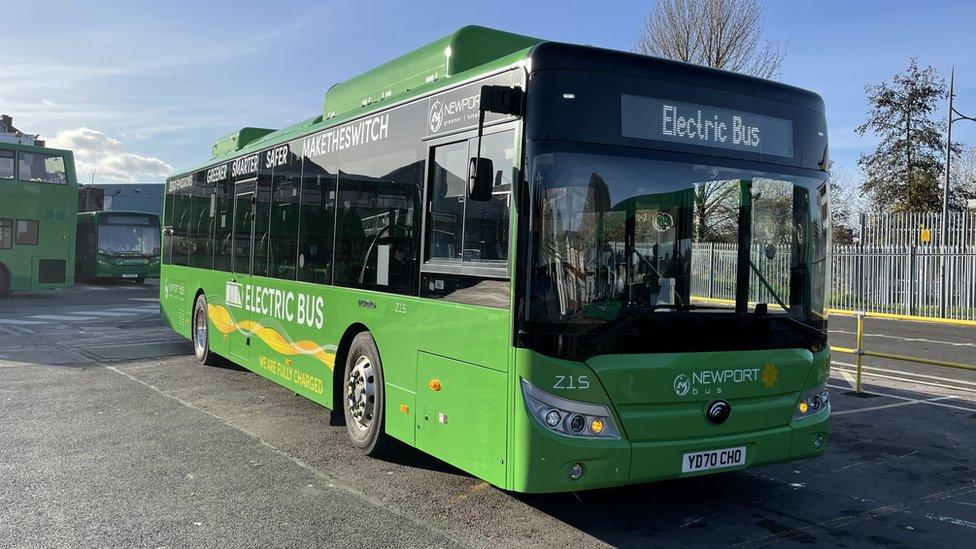
Newport Bus hopes to be running half its fleet with electric buses by the end of 2022
Newport Transport introduced the country's first electric fleet of buses in 2020 to take its total to 16, and is expecting a further 16 in March.
It hopes to have half its 100-strong fleet switched to electric this year.
But these are the only two significant ZE fleets in Wales. Even Swansea, Wales' second largest city, has no provision and the council is not aware of any plans by private operators in the city to change this.
What are Wales' zero-emission transport targets?
Welsh government has pledged to switch all TrawsCymru, external long-distance services to ZE by 2026
The 50% most polluting buses will be replaced by ZE buses by 2028
Deadline for all public service buses to be zero-tailpipe emission (no fossil fuels on board) 2035
John Dowie, director of partnerships at First UK, which owns First Cymru, said Wales had benefitted from some of the UK government schemes, which had supplied funding for the Cardiff and Newport buses, but it had always been "on the margins trying to make the best of someone else's scheme".
"I think it's time for Wales to set up its own scheme that's suited to Welsh circumstances and drive its own agenda, not just wait to pick up the crumbs from England," he added.
He estimated the cost of investment from the Welsh government to convert all buses would run to "tens of millions every year, spread over a number of years", but this would be accompanied by operators investing similar amounts.
What new buses are planned?
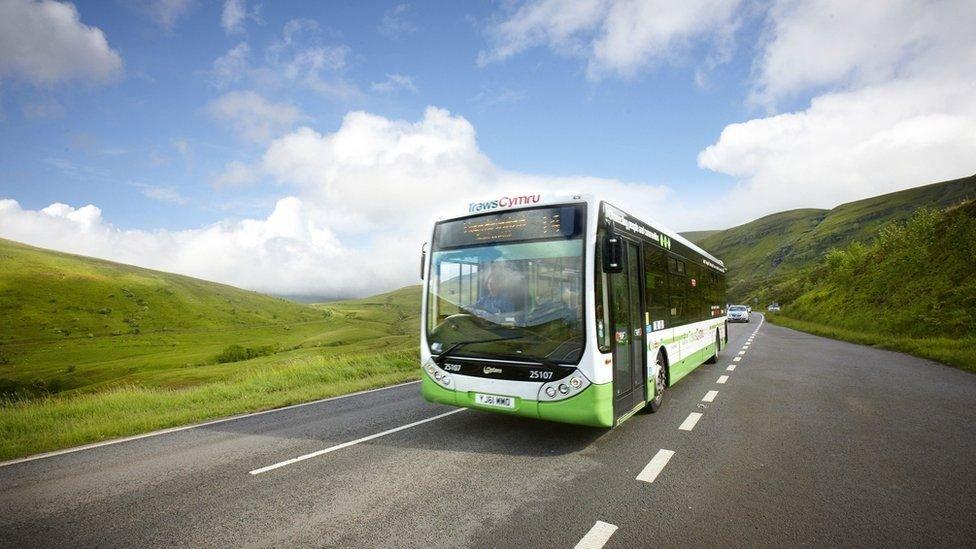
All TrawsCymru services are due to be zero emission by 2026
Six electric buses are planned for a new TrawsCymru T22 route in Gwynedd between Blaenau Ffestiniog, Porthmadog and Caernarfon, and along the T19 Blaenau Ffestiniog to Llandudno route.
Another eight are in the pipeline for the T1 service between Carmarthen and Aberystwyth.
Following a £4.8m Welsh government grant, Carmarthenshire council is seeking planning permission to build a new electric charging depot to power TrawsCymru.
How will bus operators manage?

First Cymru boss Jane Reakes-Davies said public transport had to be seen as a better option
First Cymru, which operates in south and west Wales, has committed to the 2035 zero-emission deadline.
Chief executive Jane Reakes-Davies pointed to the planned TrawsCymru Carmarthen to Aberystwyth services as an example of how electric buses could place extra financial demands on operators.
The diesel service is run with five buses, but will need eight electric buses, plus charging points, to maintain the level of service.
Mr Dowie said approximately one £30,000 charger was needed for every two buses, as well as cables to connect them to the grid and the more expensive parts for electric and hydrogen buses.
"It makes investing in zero unaffordable on most routes, so that's where we need a partnership with government to help with the extra costs, not the underlying cost that we would have had to spend anyway for diesel [buses]," he added.
Newport Bus has said it was "imperative that government takes its place in the assisted funding of zero emission bus schemes" found in all other parts of the UK.
'Get people out of their cars'
Operator Stagecoach agreed, with the company's Emma Knight pointing to the "unfortunate" lack of a funding in Wales to match England's Zebra, external plan or Scotland's low-emission bus, external scheme.
She said: "Electric vehicles are significantly more expensive than non-electric buses and government support is a key part of securing the transition to cleaner fleets.
"[But] there is a far bigger opportunity to address climate change and improve local air quality by encouraging people to move out of their cars to more sustainable public transport and active travel."
This point has also been made by Prof Mark Barry, architect of the South Wales Metro.
He said the biggest decarbonisation impact came not from how the buses were powered (although that helped) but by "getting thousands of people out of their cars and on to public transport".
Ms Reakes-Davies added things such as priority bus lanes also helped persuade passengers.
"If you're on a bus and you're just sitting in a stream of cars, there's no advantage, whereas if it is a more speedy journey by bus then you will be inclined to go by bus," she said.
The pandemic has had a big impact on behaviour, with more people using cars because of Covid fears, increasing congestion.
She said public transport had to be more appealing in order to be able to invest in having clean vehicles on the road.
Does electric make a difference to passengers?
However, it is possible that introducing electric buses could accelerate the shift towards bus use as they were "definitely more appealing" to the public, according to Bus Users UK's director for Wales Barclay Davies.
"I just think there's an acceptance that we've probably reached tipping point - we can't go on adding more and more cars to the road and more congestion," he said.
Travelling on a well-equipped, quiet electric bus was "certainly a better experience" for passengers compared to bus travel a few decades ago.
Despite the current higher costs of ZE buses, there had not been rises in the cost of tickets as a result in areas of the UK where electric buses had been brought in, he stressed.
"The costs [of buying ZE buses] should go down over time so the hope is as manufacturing scales up, the cost of vehicles will reduce.
"But operators tell us at the moment because of the price differential they are looking to governments to help them make the transmission," he added.
Mr Davies said initiatives such as free bus transport before Christmas in Swansea, Cardiff and Newport, and a month-long free bus travel pilot in Newport, external running next month, could really help give potential passengers a chance to "give it a go".
A Welsh government spokesman said: "Over the next year we will work with the public sector to create a funding scheme to support the transition to electric buses.
"In the meantime, we have provided grants to local authorities for projects that will see zero emission buses replace diesel buses on major Welsh routes."

RED OF FIRE AND BLOOD: The colour red; its mythology and association with Welsh identity
CONVERSIONS WITH YOUR CORNFLAKES: Join Nigel Owens for the latest Six Nations chat over breakfast

- Published23 May 2018
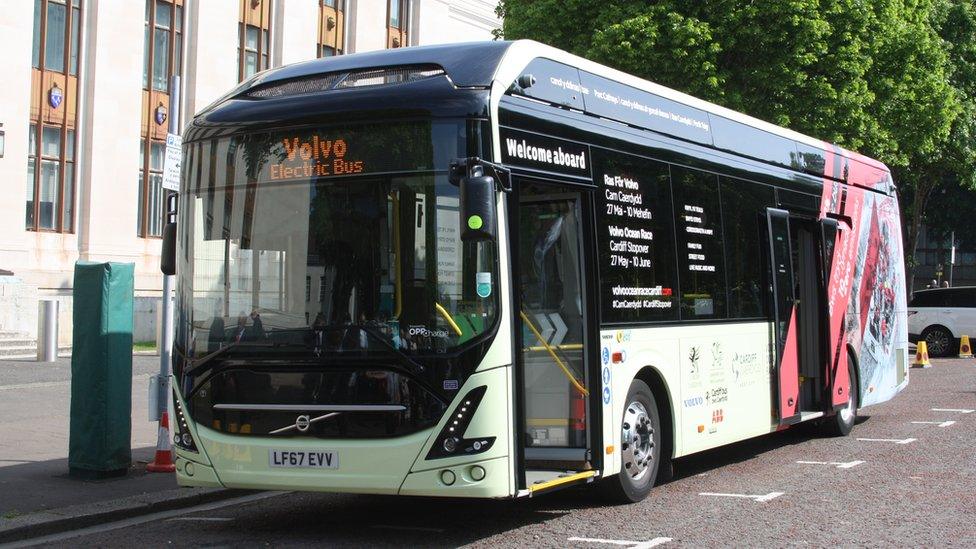
- Published11 January 2020
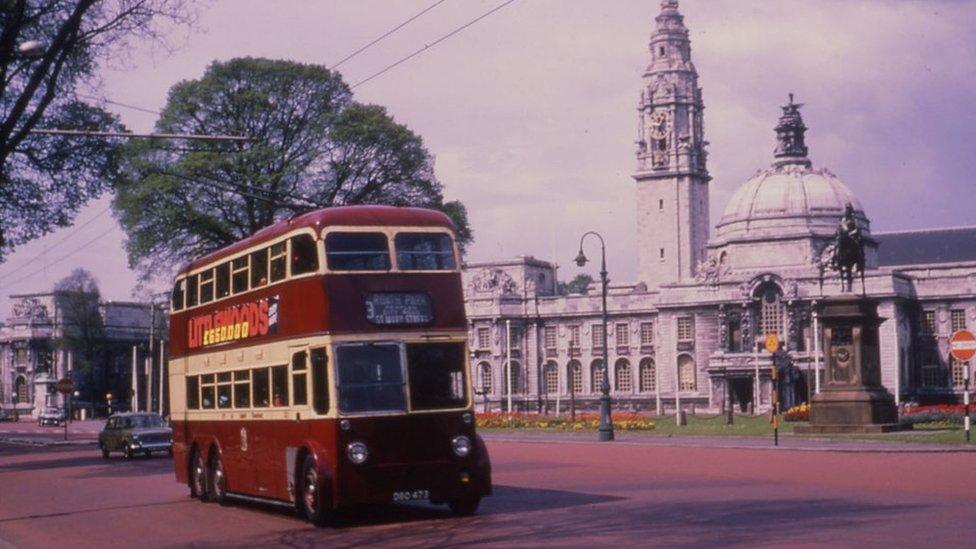
- Published19 August 2019
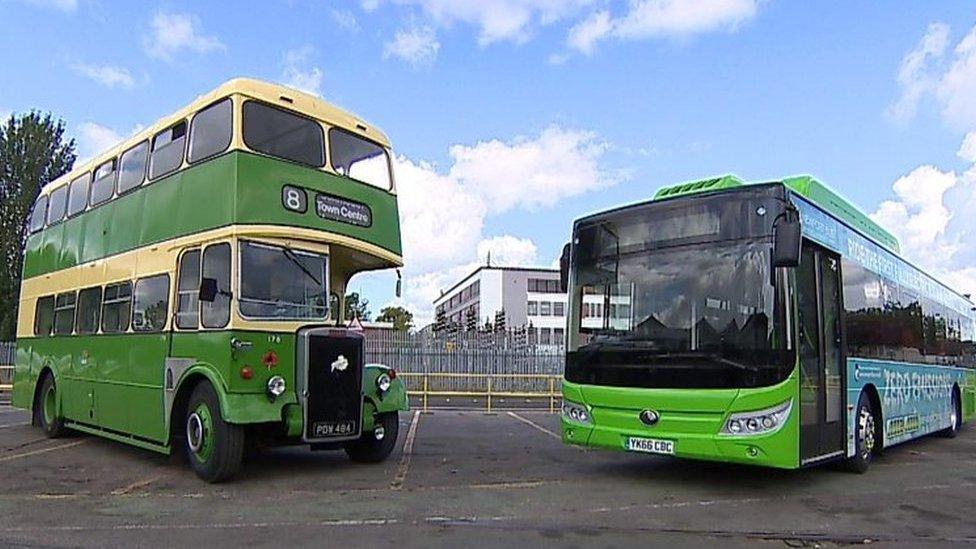
- Published6 January 2022
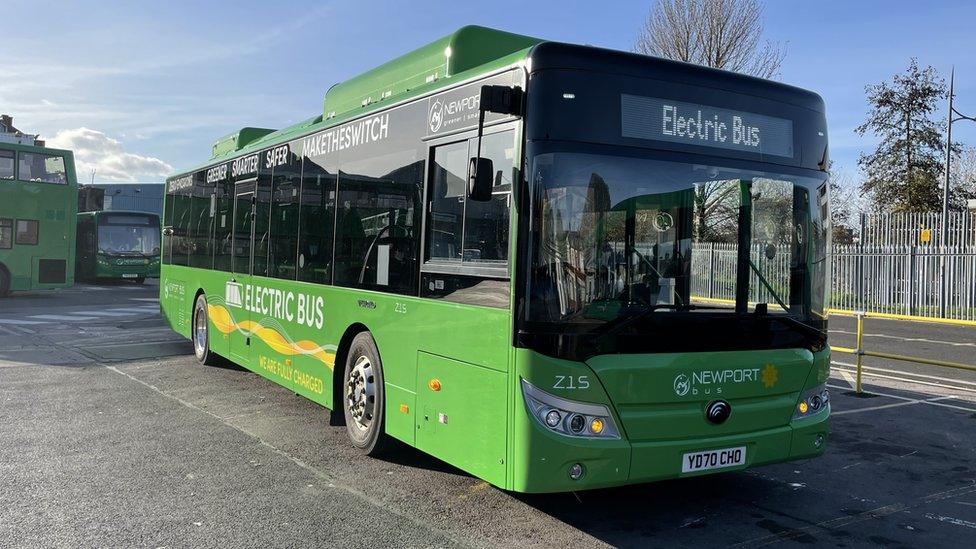
- Published18 January 2022
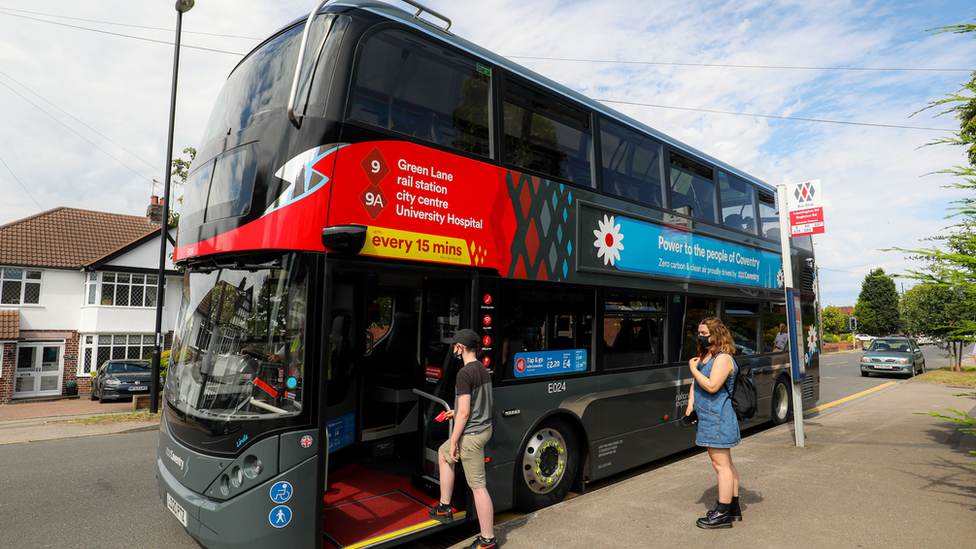
- Published19 August 2019
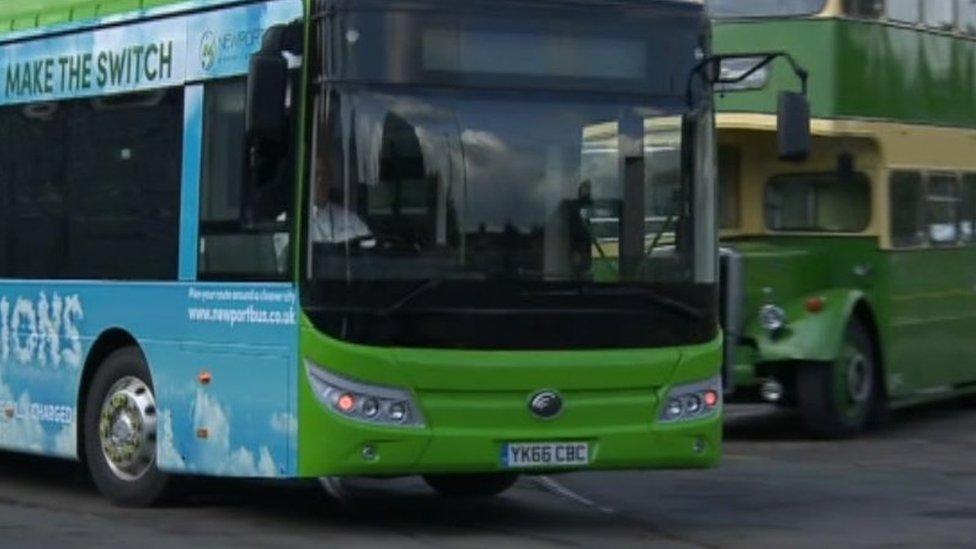
- Published18 October 2019
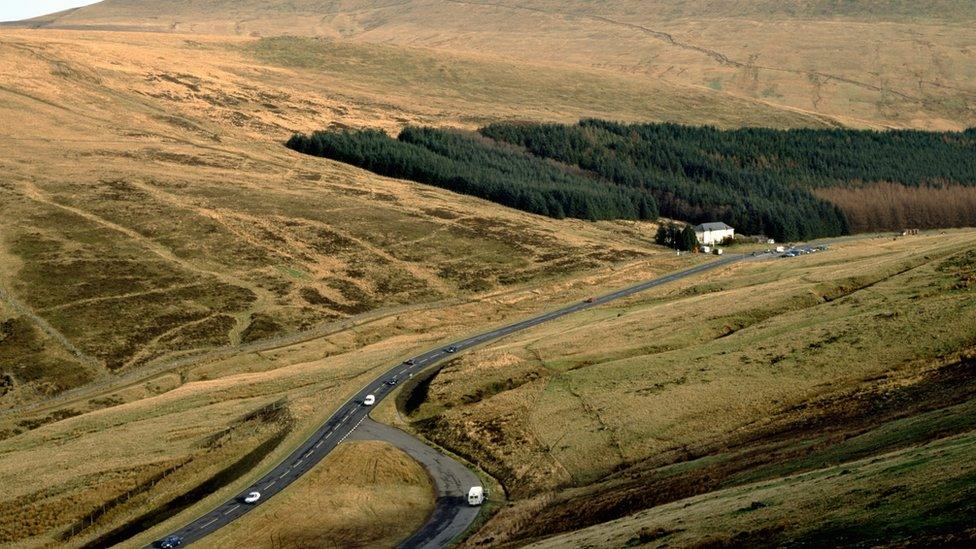
- Published31 October 2021
